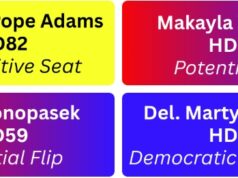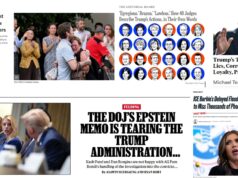 With the news yesterday that the superb FiveThirtyEight.com and its founder, Nate Silver, will be partnering up with the New York Times (congratulations Nate!), Chris Bowers is declaring that the days of blogging as “predominately a gathering place for amateur (that is, unpaid or barely paid)” are “almost completely over.” At the national level, Bowers points to the following evidence:
With the news yesterday that the superb FiveThirtyEight.com and its founder, Nate Silver, will be partnering up with the New York Times (congratulations Nate!), Chris Bowers is declaring that the days of blogging as “predominately a gathering place for amateur (that is, unpaid or barely paid)” are “almost completely over.” At the national level, Bowers points to the following evidence:
*”Established media companies and advocacy organizations hiring bloggers to blog, full-time”
*”Previously “amateur” progressive blogs became professional operations”
*”Bloggers translate blogging into consulting and advocacy work”
The end result, according to Bowers, is that “the progressive political blogosphere is now both thoroughly professionalized and integrated into the progressive media an political ecosystem.”
No doubt, there’s truth to Bowers’ observations, particularly at the national level. At the state level, however, what Bowers argues seems a bit less cut and dried. Follow me over the “flip” for a few caveats and observations.
First, I’d point out that national bloggers have been consulting and/or joining up with political campaigns for a long time now. For instance, according to Wikipedia:
In January 2003, Markos Moulitsas joined Jerome Armstrong in a political consulting partnership called Armstrong Zuniga, before being formally dissolved in December 2004. Howard Dean hired them for a time as technical consultants in 2003. Armstrong introduced the campaign to Meetup.com and directing on online advertising and blogger outreach.[10]
In 2005, Armstrong worked for New Jersey gubernatorial candidate Jon Corzine and U.S. Senate candidate Sherrod Brown’s 2006 Senate campaign in Ohio.[11] He also signed on with Mark Warner’s Forward Together PAC to develop their internet strategy, before Warner decided to not run for President in 2008.[12]
There are numerous examples of this, other than Armstrong and Moulitsas. For instance, Matt Stoller “was Blogger-in-Chief for New Jersey gubernatorial candidate Jon Corzine’s official blog” in 2005. In Netroots Rising, Nate Wilcox and I talk about Tim Tagaris, who went to work, as a paid staffer, for an Ohio Congressional candidate named Jane Mitakides in late 2004. Tagaris also worked for Sherrod Brown in 2005, Ned Lamont in 2006, and Chris Dodd in 2008, among many others. Peter Daou ran the superb Daou Report until he joined Hillary Clinton’s Senate campaign in 2006. (also worth pointing out, the Daou Report was hosted by Salon starting in February 2005)
The examples could go on and on. The point is, the idea of a purely “amateur” blogosphere, at least at the national level, has always been somewhat oversimplified and even mythologized.
Second, we’ve also seen this phenomenon at the state level. Here in Virginia, for instance, soon after Eric and I started up Raising Kaine in January 2005, another Virginia progressive blogger – John Rohrbach, went to work for Tim Kaine’s gubernatorial campaign as its internet campaign director. In 2006, several bloggers were hired by Senate campaigns in Virginia, including Jon Henke by George Allen; Josh Chernila and myself by Jim Webb. During 2007-2008, while continuing to blog at Raising Kaine, I consulted to Judy Feder, Jon Bowerbank, and the South Dakota Democratic Party. Ben Tribbett went to work for New Media Strategies while writing his blog, Not Larry Sabato. Tribbett has also served as Executive Director of the Accountability Now PAC since September 2009. Bryan Scrafford consulted to Jon Bowerbank’s Lieutenant Governor campaign while running Left of the Hill.
On the right, Vincent Harris of Too Conservative runs Harris Media, has worked for Del. Jackson Miller and for Mike Huckabee’s presidential campaign. Harris also served as “Online Director” for Bob McDonnell’s gubernatorial campaign, and is currently consulting to Keith Fimian for Congress. Jon Henke went on from the Allen campaign to become New Media Director for the Republican Communications Office in the U.S. Senate, then worked as “Online Brand Manager” for Fred Thompson’s presidential campaign, worked at New Media Strategies, etc. Jim Hoeft (Bearing Drift) has worked on “several campaigns in Hampton Roads” and has “served on the Central Committee of the Republican Party of Virginia.” Brian Schoeneman of Too Conservative worked for the Bush Administration and is communications director for the Fairfax County Republican Committee.
Essentially, we could go on and on all day with this. The point is, the “consulting” model is alive and well among state-level bloggers of all political persuasions. In addition, many bloggers wear multiple hats – candidate, elected official, party official, consultant, campaign staffer, activist, businessperson, etc., etc. Of course, the stereotype of bloggers as some sort of “pure” amateurs, living on water and bread crumbs (and no money), let alone “wearing pajamas and living in their parents’ basements,” was always highly oversimplified if not completely inaccurate. Having said that, however, it’s important to point out that the vast majority of political bloggers continue to post their diaries for free or for next-to-no money. It’s also important to stress that the vast (99.9%?) majority of political bloggers (myself included) started as pure amateurs, earning not a penny for their work. Even in cases where bloggers make a living – meager for the most part, decent in a few cases – it’s almost never on the blogging itself, but on netroots consulting services of various kinds. And even then, as far as I can tell, the vast majority of state-level political bloggers remain “amateurs” by almost any definition of the word, earning nada or next-to-nada for their blogging. (not that it matters particularly much; as long as the bloggers fully disclose what they’re doing so you can decide how much – or how little – stock to put in what they have to say)
Third, it does not appear that many state-level political blogs have been “professionalized” in the sense of being bought up (or hired) by “old media” corporations. True, there is the Washington Post Political Blog Network, of which three Virginia political blogs (Blue Virginia included) are members. But that is a completely uncompensated “partnership,” with no restrictions whatsoever on what “partner” blogs write. That’s very different than a blogger going to work for an old media outfit. In this case, it’s more a relationship of equals, as far as I can tell. Other than this, it’s hard to think of a case where a state-level political blog has been snatched up by an old media operation. Not that I’d be terribly surprised to see that at some point. Then, the state blogs would face the same issues of editorial independence, paid “firewalls,” etc. that FiveThirtyEight.com, Matthew Yglesias, Ezra Klein, Erick Erickson, and many others currently face.
Finally, in terms of a “business model” for state-level political blogging based on advertising revenues, the short answer is…there isn’t one. Period. This year, Blue Virginia probably has earned a few hundred dollars on ads, basically enough to pay our hosting fees but certainly not enough to compensate any of our writers. That’s not a complaint, it’s just a fact, and pretty much standard operating procedure for political blogs with modest (e.g., 1,000-2,000 visits per day) traffic. Until that situation changes, and political bloggers can actually earn a living – even if marginal – by blogging, it’s hard to see how this can ever become too “professionalized.” Until then, for better or for worse (or both), it’s “amateur hour.” Enjoy! 🙂













